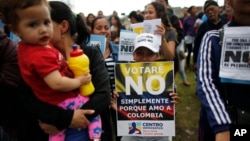Latin America bemoaned Colombian voters' rejection of a peace deal with Marxist insurgents, but regional leaders urged Bogota to keep pursing efforts to end the longest-running conflict in the Americas.
Regional countries were heavily involved in drafting a plan to end the 52-year conflict. Havana hosted four years of peace negotiations while Chile, Cuba and Venezuela acted as guarantor and observer countries.
Nations from leftist-run Venezuela to center-right Peru lamented the outcome of Sunday's referendum, where the "No" camp won by less than half a percentage point.
"Very unfortunately, yesterday a minority expressed itself, due to media attacks, a psychological war and war propaganda," Venezuela's Foreign Minister Delcy Rodriguez said, calling the vote unbelievable.
Peru's President Pedro Pablo Kuczynski warned the peace deal is “going to be very difficult to renegotiate.”
Others in the region, including center-right governments in Argentina and Brazil, said they would support reviving a peace plan, as both sides in the war have said they would.
“We consider that Colombia should not desist from the cause for peace,” Brazil's foreign ministry said in a statement, adding it was willing to collaborate.
Colombians who voted against the deal put forward by center-right President Juan Manuel Santos argue it was too lenient on the FARC rebels by allowing them to re-enter society, form a political party, and escape jail sentences.
Foreigners had celebrated the peace agreement without understanding its implications, they say.
The conflict killed about 220,000 people, displaced millions, and saw atrocities on all sides.
Colombia has become far less violent in the last decade, though it remains a big source of drug production and trafficking, which the guerrillas used as a source of funding.
“A peace deal with the FARC that genuinely worked would have seen the Colombian state extend its remit across the country, potentially pushing drugs production into Peru (and to a lesser extent Bolivia), and security challenges into Ecuador," said Nicholas Watson of Teneo Intelligence.
But in a region that is deeply polarized politically, there were also some voices celebrating the referendum's defeat.
In neighboring Venezuela, many in the political opposition were appalled by the deal, which they said gave the FARC impunity and handed their rival President Nicolas Maduro and his ally Cuban President Raul Castro a political win.
“If conversations between the Colombian government and the ‘narco-terrorist guerrilla’ are resumed, they must exclude the Cubans from the process," said Henry Ramos, head of Venezuela's National Assembly.





